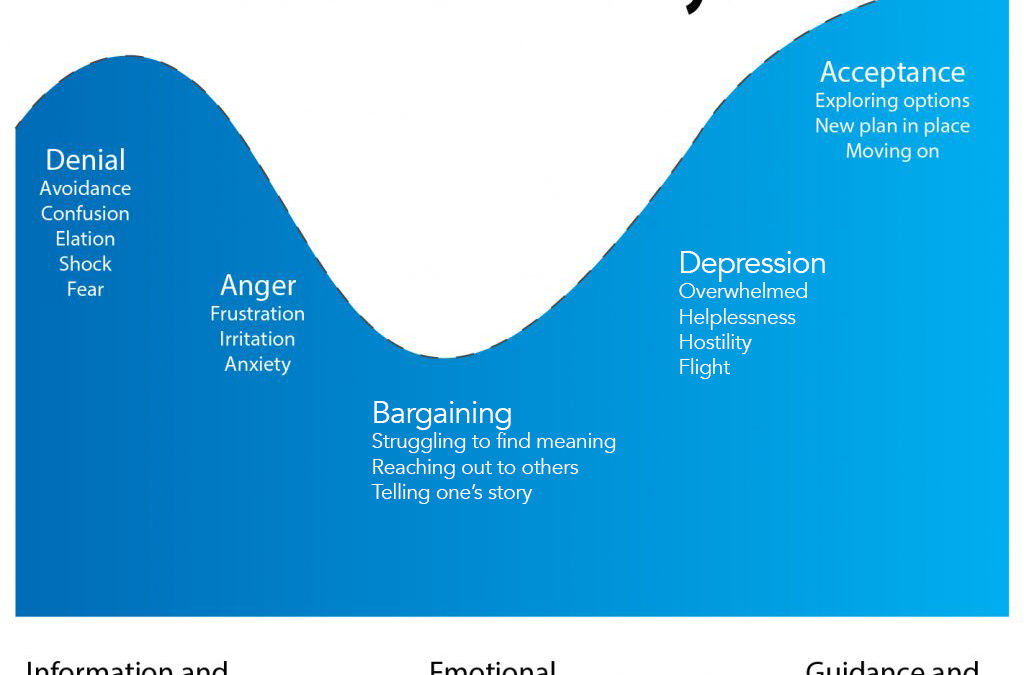We have all experienced the death of a loved one ,whether that be a Mum, Dad, son, daughter, Grandmother, Grandfather, brother, sister, Aunt, Uncle, cousin, other relative, friend or a fur baby we have all experienced that void we feel when that person is no longer with us.
The one you always turn to when the chips are down, when times are low and you just need that ear, hug or cuppa.
Elizabeth Kubler-Ross describes the five stages of grief.
DENIAL
This stage will help you initially to survive that loss, that void in your life.You feel numb, you try to deny that your loved one is no longer on this Earth plane. You are in shock as life as you once knew it has changed.
Once the feelings of denial start to fade, is when you start the healing process.
ANGER
Once your feelings of denial have faded,is when you may feel angry. The unanswered questions “why her/him when they were such a wonderful person?” “why not the murderers and evil people?” These are questions no-one can answer but are perfectly normal to want answers to. People have also been known to question their faith at this time too, whereas others find comfort in their faith knowing their loved one has now passed over in to a better place.
BARGAINING
This is another stage where you may think “please bring my loved one back and I promise never to do X, Y and Z again” or “if I do this will you bring my loved one back”. Both questions are normal, however we all know are not possible. You may also feel guilty too along with bargaining,“if I hadn’t have done…. this would never have happened”. When in reality we all know that is not the case.
DEPRESSION
Depression is one of the most commonly accepted stages of grief,and is often confused with other stages of grief, as not everyone understands all the stages we need to experience. The world may seem overwhelming, you may feel that numbness which you felt whilst in the denial stage,you may not want to get out of bed and may feel as though you are in a dark place. You may or may not want to be around others, you may want to talk constantly about your loss, or not at all. You may also feel hopeless,some have even has suicidal thoughts “what is the point of going on?”
ACCEPTANCE
The final stage identified by Elizabeth Kubler-Ross is that of acceptance. You don’t feel “it’s ok my loved one died” you feel “I know my loved one has died, and I am at peace with that.” Your emotions start to return to normal, you stabilise, you enter back into the normality of your life. Of course you will always miss your loved one,that will never go away,but you are able to live in peace with their passing. Good days out weigh bad days, you start to socialise again, you want to see people, and you may even enter new relationships.
We all need to experience all of these stages of grief, however there is no time scale in which you need to “complete” them, some go from denial to depression and back to anger. What you experience is right for your healing process. Healing is a very personal experience and no-one can tell you how you should and shouldn’t do it. Just maybe to access help from a professional when you need it.
Grief also has symptoms associated with it. Some may experience one or more of these, some may not experience any. Grief is very personal and no two people will experience the same. They may experience similar but not the same. These symptoms may present themselves physically,spiritually,or socially.
1 Crying.
2 Headaches.
3 Difficulty sleeping.
4 Questioning the purpose of life.
5 Questioning your spiritual/faith belief system.
6 Feelings of detachment.
7 Isolation from friends and family.
8 Abnormal behaviour.
9 Worry.
10 Anxiety.
11 Frustration.
12 Guilt.
13 Fatigue.
14 Anger.
15 Loss of appetite.
16 Aches and pains.
17 Stress.
18 Increased alcohol or cigarette consumption.
19 Change in bowel and bladder habits.

Recent Comments